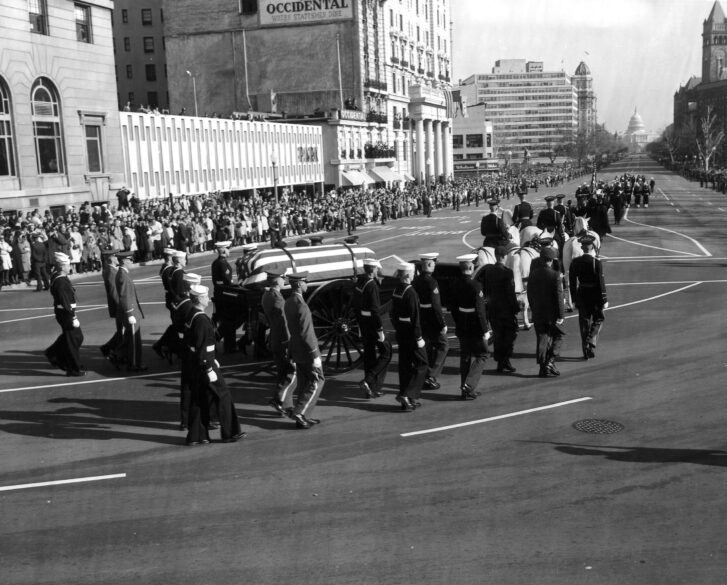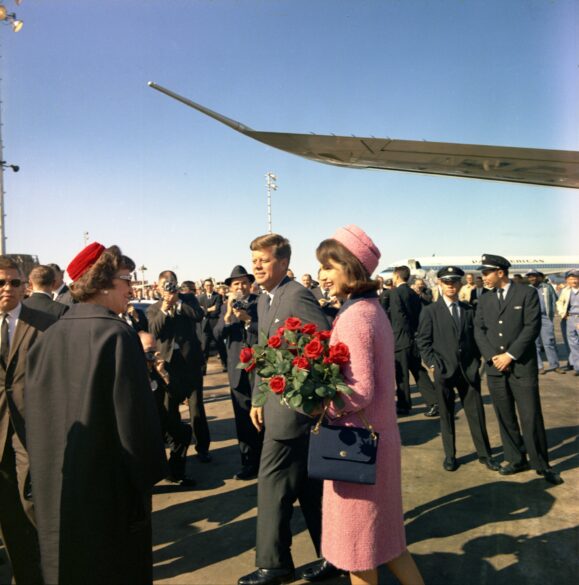From the Archives
By Mary Woodward
JACKSON – In working on a history project that explores some pivotal moments in our nation’s history, I came across some poignant reflections in Bishop Gerow’s diary. The passages are from November 1963. This of course was the moment when President John Kennedy was assassinated in Dallas, Texas. Many of us have seen the grainy video coverage of that violent act and the ensuing days of mourning, rituals and interment. It was a shocking moment in the country, which seemed to be brimming with optimism and opportunity. It marked an initial loss of innocence in a decade of change.

I now share the following entries from the diary to chronicle how our local church experienced those momentous days. The language used was the language of the day, so I have left it unchanged.
November 22 (Friday):
Today about 12:30 President Kennedy was shot and killed. He was on a visit to Dallas, Texas. When the news came over the radio, I am told that in our Catholic schools here in Jackson – or at least in many of them – the children dropped to their knees in prayer and many of them wept. Television station WJTV here in Jackson asked me to come out to the station and make a statement which I did in which I praised Mr. Kennedy for his high principles and spoke of the hatred that caused his assassination and asked the public for prayers for the country and for the deceased.
November 23 (Saturday)
Today in my private chapel I offered Mass for President Kennedy. Later, the television station WLBT asked me to come out to the station and speak which I did. In substance I said it is time to reflect and pray – to reflect on the love of our neighbor that our Divine Lord taught and to reflect upon the hatred that burns in the breast of some. These must share with the assassin the blame for this crime, asked prayers for our country, for the new President, and for Mr. Kennedy, etc. I announced on this station as well as yesterday that on Monday at noon I would celebrate a Pontifical Requiem Mass to which the public is invited.
November 25 (Monday)
At noon in St. Peter’s Co-Cathedral I sang a Solemn Mass of Requiem for the President.
The procession to the church started in the school yard. In the procession were the Fourth Degree Knights of Columbus in full regalia. Clergymen from many of the non-Catholic churches in the city, most of them in their church robes, preceded our diocesan clergy. Amongst them were Rt. Rev. John M. Allin, Coadjutor Bishop of the Episcopal Diocese of Mississippi and a good group of Episcopal clergymen, Rabbi Perry Nussbaum of the local Synagogue, Dr. Seth Granberry of the Capitol Street Methodist Church (who by the way replaces Dr. Clark who was forced by his congregation to resign because of his views of justice to the Negro), Dr. Jeff Cunningham of the Galloway Methodist Church (who replaced Dr. Selah, who like Dr. Clark had to resign because of his views), Rev. Wade Koons of the Trinity Lutheran Church (who had had much opposition from his congregation because of his Christian views on race). Rev. Fred Tarpley of Ridgecrest Baptist Church. These ministers were given seats in the church in the front pews – our own clergy, who were not on ceremonies, were in the choir loft.
Among the civic public figures in the church were former Governor Hugh White, former Governor J. P. Coleman, Mayor Allen Thompson, Attorney General Joe Patterson, Secretary of State Heber Ladner, State Superintendent of Education J. M. Tubb, and State Tax Collector William Winter.
The church was filled with people, seated in all the pews and standing in close formation in all available standing room. One of the policemen outside told one of our priests that at least a thousand people were turned away because there was no room in the church.
At the Gospel time I spoke. My theme was God’s love of us his children and our duty to love Him and His other children. At the Communion time it was a pleasure not only to see the large number who received Communion, but also to note that amongst those who received were a generous sprinkling of Negroes. It was good for the state and city officials to see these Negroes coming to the Altar rail and kneeling beside the whites and doing this without any sign of race discrimination.

After the Mass, the clergy, our own and the non-Catholics, gathered in the Chancery Office and witnessed on television the funeral of President Kennedy in Washington. This being over about 2:30 we all gathered in the general dining room of the Sun-n-Sand Motel for lunch. It is interesting to note that Father Bourges, S.V.D., Pastor of Holy Ghost Church, who is a Negro went into the dining room with the rest of us and was served without comment.
I felt much gratified at the fine ecumenical spirit of friendliness exhibited in our relationship with our non-Catholic ministers. In my own mind these ministers who gathered with us are good, earnest, sincere men who wish to honor and serve God and they do so in the way that they understand to be the way that God wishes.
(Mary Woodward is Chancellor and Archivist for the Diocese of Jackson.)
